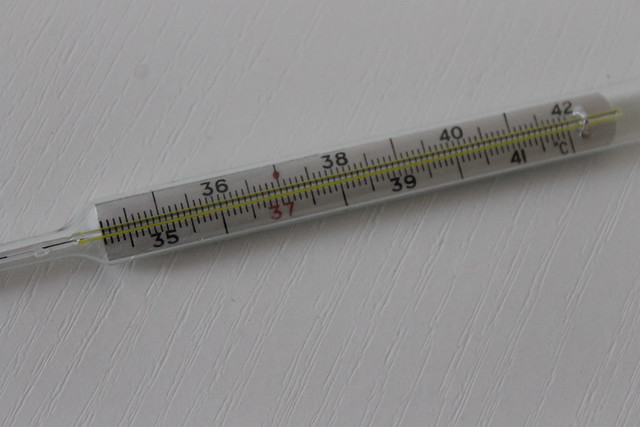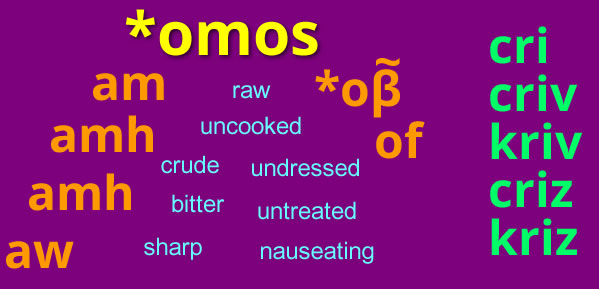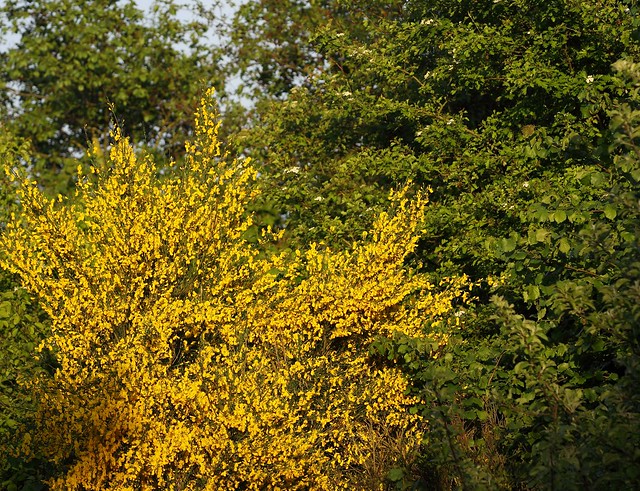Words for bare, naked and related things in Celtic languages.
Words marked with a * are reconstructions.
| Old Irish (Goídelc) | lomm [l͈om] = bare, naked, smooth, exact, threadbare, exact, strict, pure, unadulterated, clear (sounds), unlenited |
|---|---|
| Middle Irish (Gaoidhealg) | lomm, lom = bare, naked, smooth, exact, threadbare, exact, strict, pure, unadulterated, clear (sounds), unlenited lomnocht, lomnacht = (stark) naked, barefaced |
| Irish (Gaeilge) | lom [l̪ˠɑumˠ/l̪ˠoumˠ/l̪ˠʌmˠ] = bare, thin, close; to lay bare, strip, denude, become bare lomadh = baring, shearing, stripping, denudation, improveishement, fleecing lomair = to shear, fleece, denude, despoil lomaire = shearer, fleecer, shark lomairt = shearing, clip, denudation, spoliation |
| Scottish Gaelic (Gàidhlig) | lom [l̪ˠɔum] = bare, naked, nude, bleak, plain, unadorned, defenceless, destitute, gaunt, meagre, threadbare, leafless, net (weight) lomnochd = nakedness, nudity, bare, naked lomradh = denuding, fleecing, shearing, fleece lomadair = shearer, shaver, barber lomadh = shaving, shearing, shave, making bare, stripping moir lom = smooth / calm sea |
| Manx (Gaelg) | lhome = arid, bald, bare, fleshless, leafless, meagre, naked, nude, scraggy, severe, spare, unset, unvarnished, open, neat lhoamid = smoothness, nakedness lommyrt = clipping, shear, (sheep-)shearing lhomeyder = plunderer, shearer, stripper loamreyder = fleecer, shearer |
| Middle Welsh (Kymraec) | llum, llwm, llom = wave |
| Welsh (Cymraeg) | llwm [ɬʊm] = bare, barren, naked, threadbare, worn, ragged; destitute, needy, poor, plain, simple, humble, empty llwmder = poverty, nakedness, bareness llwmhau = to denude, lay bare, despoil, impoverish, deprive llwmedafedd, llwm ei gotwm = threadbare y llety llwm = poor place or situation, state of starvation, destitution troednoeth = barefoot |
| Cornish (Kernewek) | lomm = bare, naked lommder = bareness lommas = area of unprofitable farmland lommhe = to bare, strip bare |
| Old Breton (Brethonoc) | lom = nude, naked |
| Middle Breton (Brezonec) | loum, lom = drop |
| Breton (Brezhoneg) | lomm [ˈlɔmː] = drop, shot (of drink), a modest, insignificant quantity, nothing lommad = drop (of) lommig [ˈlɔ̃mːik] = small drop, a modest quantity, insignificant |
Etymology: possibly from the Proto-Indo-European *pleus- (plucking, peeling, feathers, fleece) [source].
| Proto-Celtic | *noxtos = naked |
|---|---|
| Old Irish (Goídelc) | nocht [n͈oxt] = naked, bare, uncovered |
| Middle Irish (Gaoidhealg) | nocht, noco = nkaed, bare, uncovered |
| Irish (Gaeilge) | nocht [n̪ˠɔxt̪ˠ] = naked, bare, exposed; to bare, strip, uncover nochtach = naked person nochtachas = nudity nochtadh = baring, exposure, disclosure, revelation, appearance nochtaine = nakedness |
| Scottish Gaelic (Gàidhlig) | nochd [n̪ˠɔ̃xg] = naked person, nakedness |
| Proto-Brythonic | noeth = wave |
| Middle Welsh (Kymraec) | noɨθ = naked, bare |
| Welsh (Cymraeg) | noeth [noːɨ̯θ/nɔi̯θ] = naked, nude, undressed, stripped, bare, ill-clad; bare, exposed, bleak, uncovered, bald, hairless, blank noethi = to bare, undress, denude, remove from, strip, uncover, expore, go bald, deprive, lay bare noethlun = a nude (in art), destitute noethlwm = naked, unclothed, ill-clad, bare, bleak, desolate noethlymunwr = nudist, naturist, stripper, streaker noethni = nakedness, nudity, barrenness, bleakness |
| Middle Cornish (Cernewec) | noath = naked, bare noatha = nakedness noeth = bare, uncovered, void, destitute |
| Cornish (Kernewek) | noth = bare, naked, nude nothedh = nudity |
| Old Breton (Brethonoc) | noit = nude, green |
| Middle Breton (Brezonec) | noaz, noas = nude, green |
| Breton (Brezhoneg) | noazh [ˈnwɑːs] = nude, green noazhkorfer = nudist noazhkorferezh = nudism |
Etymology: from the Proto-Indo-European *nogʷtos from *negʷ- (bare, naked) [source]. Words from the same PIE root include gymnasium, naked and nude in English, naakt (nude, naked, bald) in Dutch, and nacht (naked, bare) in German [source].
Sources: Wiktionary, Am Faclair Beag, Online Manx Dictionary, Teanglann.ie, eDIL – Electronic Dictionary of the Irish Language, In Dúil Bélrai English – Old Irish glossary, Geiriadur Prifysgol Cymru, Gerlyver Kernewek, Gerlyvyr Cernewec, Dictionaire Favereau, TermOfis, Le dictionnaire diachronique du breton, Geriafurch, English – ProtoCeltic WordList (PDF), Etymological Dictionary Of Proto Celtic












